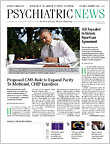Thomas William Salmon, M.D., was a physician ahead of his time in many ways; in addition to being a pioneer of the mental hygiene movement of the early 20th century that sought to reform and modernize the care of individuals with mental illness, he was one of the first physicians to appreciate the long-term impact of “shell shock” on soldiers—decades before posttraumatic stress disorder (PTSD) became a recognized condition.
Renowned neuroscientist Bruce McEwen, Ph.D., envisions himself as a forward-thinking person as well, and so it was a fitting tribute when he learned that he would be the recipient of the 2015 Thomas William Salmon Lecture and Medal in Psychiatry—an honor bestowed annually by the New York Academy of Medicine (NYAM). The award presentation was on March 25.
“Salmon knew intuitively how important the brain was to the overall health of a person and was especially interested in how it handled stress,” said McEwen, who is the Alfred E. Mirsky Professor of Neuroscience and head of the Harold and Margaret Milliken Hatch Laboratory of Neuroendocrinology at the Rockefeller University. “I was honored when the New York Academy invited me to lecture in his name.”
During his talk, “The Brain on Stress: Epigenetic Mechanism of Brain Plasticity Through the Life Course,” McEwen discussed some of his latest research around the role of stress and stress hormones in shaping brain activity, particularly plasticity—the brain’s ability to change the number and strength of connections in response to different stimuli.
McEwen noted how epigenetic regulation—modifiable chemical changes to DNA or the histone proteins on which the DNA is wound—plays a key role in the brain’s stress response. While these changes are not permanent, they can have long-lasting effects. One example is the epigenetic changes that occur in biological embedding, wherein stressors occurring in early life predispose the brain to respond in a certain way in adulthood.
McEwen believes that appreciating epigenetics is important when considering psychiatric medications. “We used to think that maybe we could find a pharmacological magic bullet for mental disorders, penicillin for depression as it were,” he told Psychiatric News in an interview. “But I think we need to consider pharmacological agents in a different way. We should use agents to open up a window of heightened plasticity, during which time an intervention like psychotherapy might have a more pronounced effect.”
As an example, McEwen cited PTSD, which is intimately tied to stress. “You’re not going to eliminate that painful memory,” he said. “But with a window of plasticity, we could redirect where the memory goes.”
That is just one possibility; McEwen thinks a focus toward the epigenetic changes that regulate brain plasticity can be used to treat a variety of mood and anxiety disorders, noting that there is already a history of using histone-targeting drugs like valproic acid as mood stabilizers. He is also hopeful this mindset can be applied to other psychiatric conditions, though more research is needed to better understand the role of epigenetic changes for psychotic disorders like schizophrenia.
Each year, the Thomas William Salmon Lecturer is chosen by NYAM from among the nation’s most talented investigators and is invited to share his or her research with the New York area psychiatric community. McEwen joins an esteemed list of lecturers that include Nora Volkow, M.D., Eric Kandel, M.D., and Kenneth Kendler, M.D. ■
More information about the 2015 Thomas W. Salmon Award and lecture can be accessed
here.

